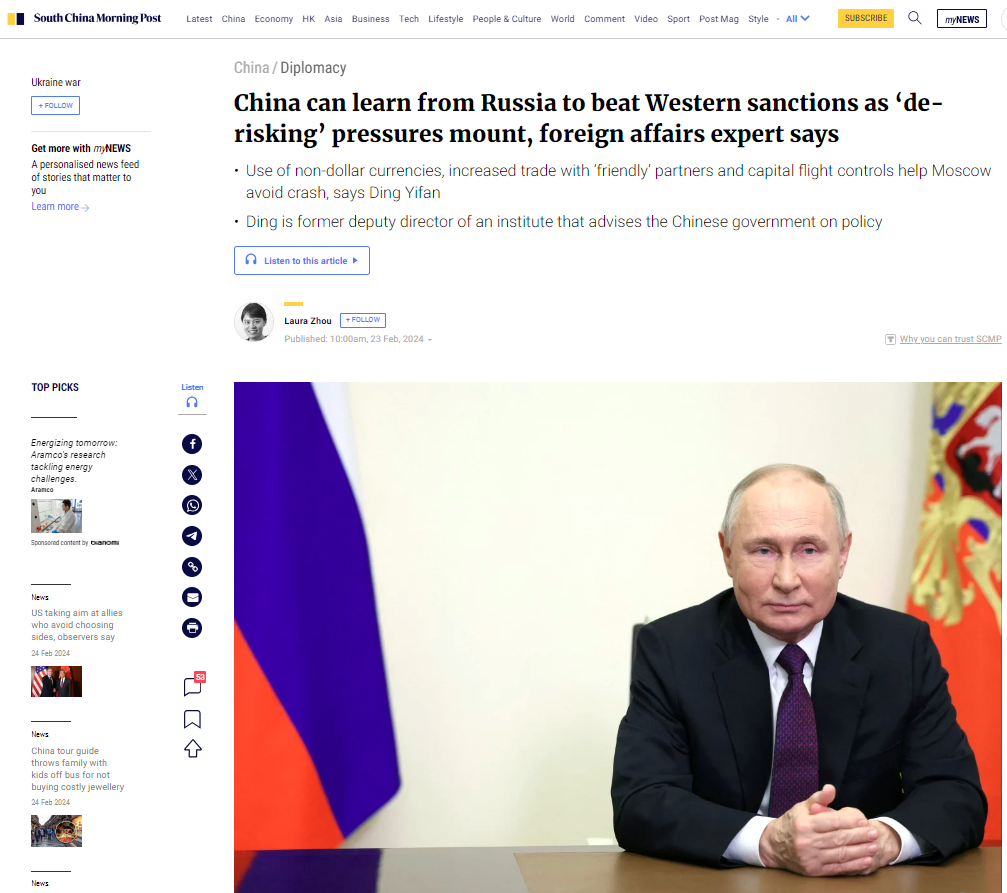LATEST INSIGHTS
Your Present Location: LATEST INSIGHTS[SCMP] Ding Yifan: China can learn from Russia to beat Western sanctions as ‘de-risking’ pressures mount, foreign affairs expert says
Source: SCMP Published: 2024-02-23

Russia's success in rising above Western sanctions through de-dollarisation and shoring up trade partners can be a valuable lesson for China as pressure mounts over 'de-risking', according to a Chinese international relations specialist who once worked at an institute that advises the central government.
'Russia has provided us many precious experiences that we can learn from to deal with financial and economic sanctions in the future,' said Ding Yifan, formerly the deputy director of the Institute of World Development under the State Council's Development Research Centre, at a seminar in Beijing on Wednesday.
Despite the war in Ukraine and mounting sanctions, the Russian economy grew by 3.6 per cent last year, beating analysts' expectations and marking a significant rebound from 2022, when its gross domestic product contracted by 2.1 per cent.
Russian President Vladimir Putin declared last month that his country had become Europe's biggest economy in terms of purchasing power parity.
Ding's assessment comes as the war in Ukraine enters its third year with no end in sight.
Soon after the war began in 2022, the US and its key allies imposed unprecedented export controls, financial sanctions and oil price caps on Russia.
They also banned Russian banks from using global financial messaging system Swift, short for the Society for Worldwide Interbank Financial Telecommunication, freezing hundreds of billions of dollars of Russian central bank assets and curbing the flow of military technology to Moscow.
But the Russian economy did not crash as the West expected. Instead, policymakers in Moscow quickly stepped in with a series of measures, including capital controls and monetary policy tools.
In particular, Moscow has accelerated the use of non-dollar currencies in foreign trade while steadily increasing trade with non-Western partners, which Ding said could offer 'important lessons' for China.
'The non-dollar trade has supported Russia's economic development and ensured its financial security,' Ding said.
'We would face a similar situation, especially in recent years as calls for decoupling or de-risking have mounted.'
Russia's efforts to reduce the use of the US dollar in trade appear to have offset pressure from the West, according to Russian customs service data, which showed Russia's 2023 exports to Europe dropped by 68 per cent to US$84.9 billion, while its exports to Asia rose by 5.6 per cent to US$306.6 billion.
Russia's trade with both China and India reached new heights, standing at US$240 billion and US$65 billion respectively.
There have been discussions among the Brics bloc of emerging markets - whose members include China, Russia, India, Brazil and South Africa - about increasing the use of local currency in trade between member states.
Meanwhile, Russia has ramped up its energy exports to 'friendly countries', which accounted for around 84 per cent of its total exports in 2023, according to Russian deputy prime minister Alexander Novak.
Ding said this highlighted the importance of stable ties with developing countries.
Ding noted that even when an overwhelming majority of countries voted in favour of a 2022 United Nations resolution demanding that Russia withdraw from Ukraine, none of the countries from the Global South joined the US-led sanctions.
'The fact that none of the non-Western countries are involved in the financial or economic sanctions against Russia has ensured that Russian trade can proceed smoothly,' Ding said. 'This is an example Russia has set for us on how to keep international trade growing amid financial sanctions.'
Ding said China could also learn from Russia's economic resilience in the face of capital flight.
When the value of the rouble reached a new low in 2022, Putin did not rush to sell foreign currency from Moscow's National Wealth Fund to defend the Russian currency, Ding noted. Rather, he required European countries to pay for Russian natural gas in roubles, which helped stabilise the currency.
Putin also ordered foreign companies leaving the Russian market to sell their assets for half of their value and pay 10 per cent of their sale proceeds to the state.
To boost its economic resilience, Russia has also stepped up efforts to draw investment from 'friendly' countries, including China.
Ding said these moves have helped Russia avoid 'following the playbook set by the West' and allowed it to invest more in its domestic supply chain.
'In the face of financial sanctions, the priority is to keep its supply chain safe and stable,' he said. 'This is a very important message to China, too.'























































































 京公网安备 11010802037854号
京公网安备 11010802037854号





